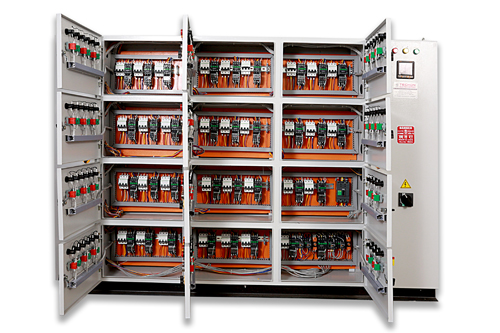PCC, MCC AND APFC

PCC, MCC AND APFC
PCC (Power Control Center), MCC (Motor Control Center), and APFC (Automatic Power Factor Correction) systems are integral components in industrial electrical installations, designed to optimize power distribution, motor control, and energy efficiency. The PCC houses the electrical distribution panels that manage and distribute electrical power from the incoming supply to various parts of the facility, ensuring protection and monitoring of the power system. The MCC is specifically focused on controlling and protecting motors, which are essential in industrial environments, by providing centralized control, protection, and automation.
The APFC system, on the other hand, automatically adjusts the power factor of the electrical system to optimize energy consumption, reduce penalties from utility providers, and improve overall system efficiency. At Padmavatee Electrical Services, we design, install, and maintain these systems to ensure smooth, efficient, and reliable operation of industrial facilities, helping clients optimize both operational costs and energy use.
Frequently Asked Questions
PCC (Power Control Center) is responsible for the main power distribution in an industrial facility, managing the incoming electrical supply and distributing it to various sections of the plant. MCC (Motor Control Center), on the other hand, focuses on controlling and protecting electric motors, providing centralized control, monitoring, and protection for motor-driven equipment. While PCC handles overall power management, MCC specifically manages motor circuits.
An APFC (Automatic Power Factor Correction) system automatically adjusts the power factor of an industrial electrical system to maintain it at an optimal level. A low power factor can lead to higher energy costs and penalties from utility companies. The APFC system uses capacitor banks to improve the power factor, ensuring efficient power usage and reducing the risk of electrical fines.
Power factor correction is crucial in industrial settings because it helps reduce electricity bills, optimize energy consumption, and avoid penalties from power providers. A poor power factor means that more current is required to deliver the same amount of useful power, leading to higher energy losses and costs. An APFC system ensures that the power factor stays within optimal levels, making the electrical system more efficient.
An MCC (Motor Control Center) provides several key benefits, including centralized motor control, protection, and monitoring, which ensures the safe and efficient operation of motors. It allows for easy maintenance and troubleshooting, reduces downtime, and integrates automation and control features for improved productivity. Additionally, it ensures the protection of motors from overloads, short circuits, and other electrical faults.
Regular maintenance of PCC, MCC, and APFC systems includes routine inspections, cleaning, and testing of all components like circuit breakers, fuses, busbars, contactors, and capacitors. Troubleshooting typically involves identifying faults in power distribution, motor control circuits, or power factor correction units. Advanced diagnostic tools such as thermal imaging, voltage testing, and insulation resistance testing are used to detect issues, ensuring that the systems continue to run safely and efficiently.


